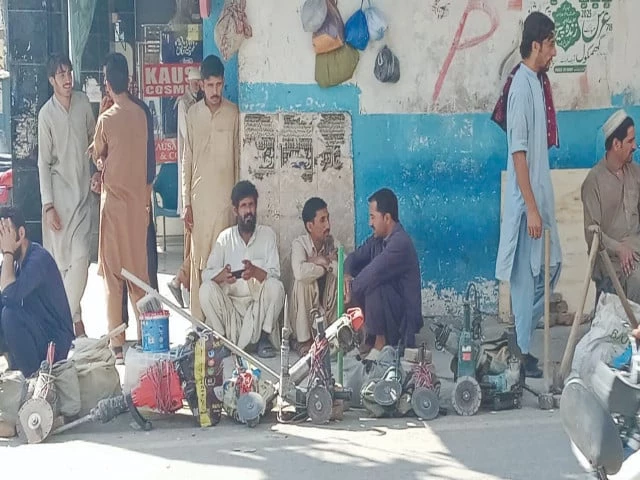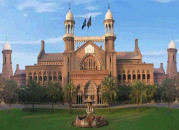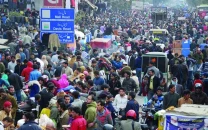Security curbs paralyse twin cities for 2nd day
Road closures and market shutdowns cripple daily life for residents, daily wagers

For the second consecutive day on Saturday, the twin cities of Rawalpindi and Islamabad remained at a standstill owing to stringent security measures implemented to prevent the Tehreek-e-Labbaik Pakistan (TLP) protest.
With containers placed at key intersections and trenches dug across major routes, Rawalpindi resembled a city besieged by barricades.
All commercial, business and social activity remained paralysed for a second day. The continued closure of wholesale markets and fruit and vegetable bazaars left thousands of daily-wage labourers and cart-pullers without work, while helpers and drivers of goods vehicles also lost their means of livelihood.
The suspension of goods transport caused a sharp surge in the prices of fruit, vegetables, and essential commodities across the district.
The Metro Bus Service (MBS) remained suspended for a second day as well, severely inconveniencing thousands of commuters and inflicting financial losses estimated in the tens of millions of rupees on the operating company.
The blockade of goods transport halted supplies from Rawalpindi to other regions, including Azad Kashmir and Abbottabad, while inbound consignments of flour, fruit, and vegetables from other districts were also disrupted.
Educational institutions — including schools, colleges, and universities — remained closed for two days, bringing academic activity to a complete halt, although children appeared to relish the unexpected holidays.
Hospital services were similarly disrupted, with outpatient departments receiving only a fraction of their usual number of patients. At Allied Hospital, where three to four thousand patients are typically treated daily, attendance fell dramatically, leaving doctors and paramedical staff idle.
Telephone and internet services also remained suspended. With police personnel deployed on security duties, undertrial prisoners from Adiala Jail could not be produced before the courts for a second consecutive day, resulting in the adjournment of hearings in approximately 9,000 cases across 81 sessions, civil, family, and special courts in Rawalpindi district.
Motorcyclists struggled to navigate blocked roads, while many women and children were forced to walk several kilometres on foot. Ibrahim Khan, a handcart labourer at the wholesale market, said he had been without work for three days. "I earn my living by loading and unloading goods, but for the last three days there's been no work at all. We're surviving on borrowed money," he lamented.
Transportation of construction materials was also affected by the road closures. Labourers Faisal, Rizwan, and Akbar Khan, who arrived at Banni Chowk and Raja Bazaar early in the morning in search of work, said no employer had hired them for two days. "We waited from morning till evening and ate food provided by charity kitchens," they said.
With major roads sealed, vehicles and motorcycles were diverted through narrow residential streets, posing risks to women and children. Nazir Ahmed, a local resident, complained that whenever an issue arises, Murree Road is closed, forcing heavy traffic into neighbourhood lanes where speeding vehicles endanger children.
Sharjeel Mir, President of the Central Traders' Association, urged the authorities to establish a practical legal framework for peaceful demonstrations, warning that repeated road closures were destroying businesses. "Foreign investors have already left, and now domestic investors are being forced to follow suit. If traders are not protected, even local capital will flee abroad," he warned.
President of the All Pakistan Private Schools and Colleges Association, Malik Naseem, said that prolonged school closures over minor issues amounted to "an assault on education." "We already had too many holidays. With only five months left until annual examinations, the academic calendar was back on track - and now schools have shut again, disrupting studies and making it difficult for senior students to complete their syllabuses," he added.
District Bar Association Secretary-General Advocate Malik Asad remarked that the district courts serve as a commercial hub. "When access routes are sealed, the entire hub grinds to a halt. The government, opposition, and establishment must designate a specific area for protests. The current situation has turned the country into a farce - the rule of law and supremacy of the Constitution must prevail," he emphasised.



















COMMENTS
Comments are moderated and generally will be posted if they are on-topic and not abusive.
For more information, please see our Comments FAQ